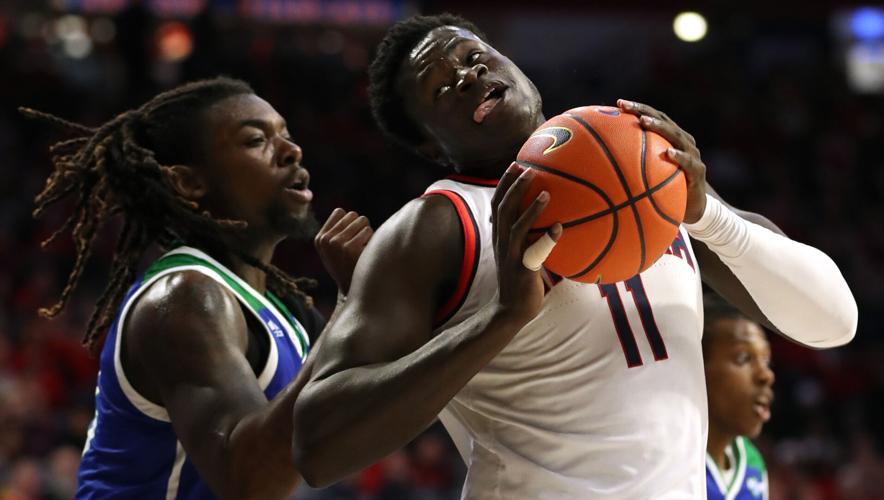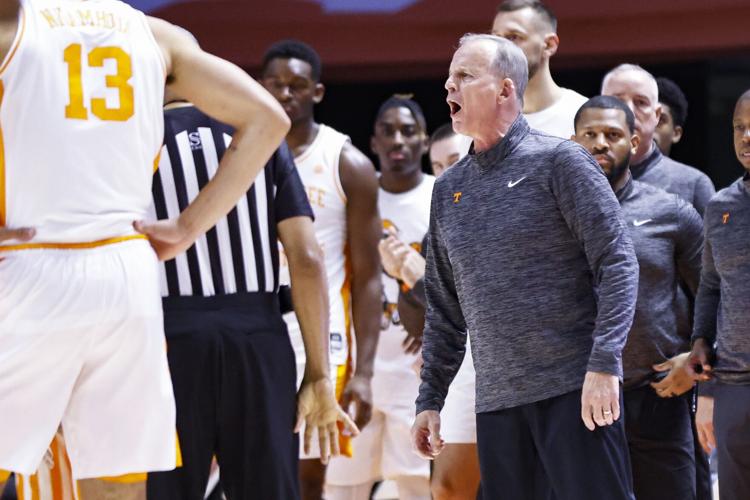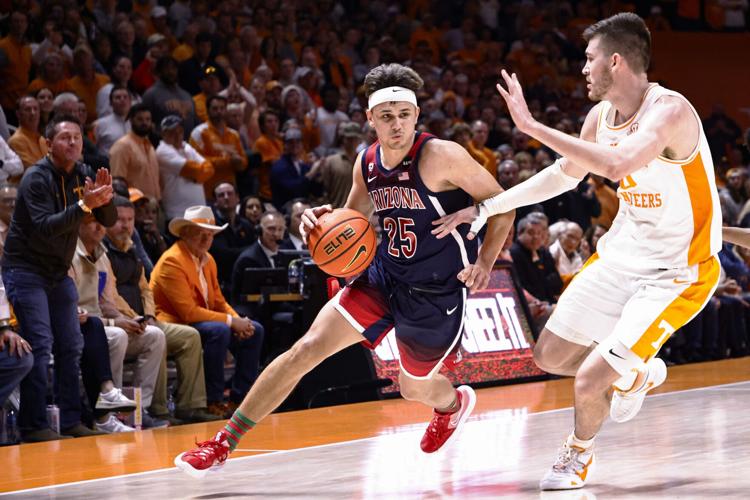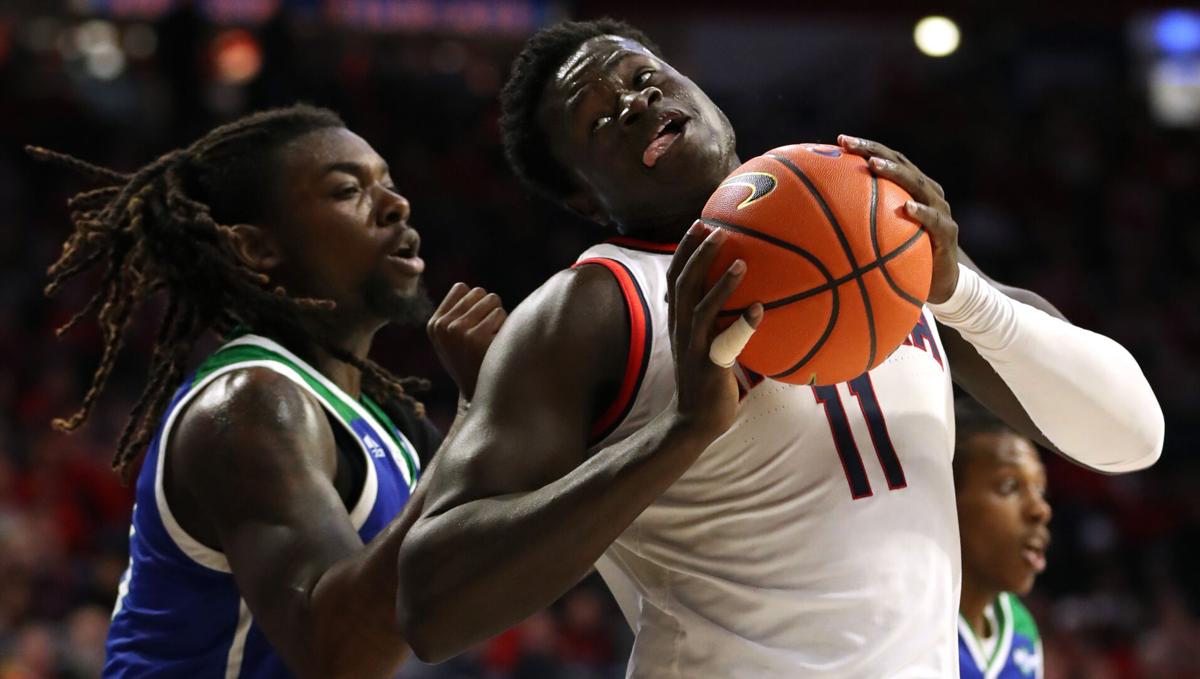Of the 1,124 home games played by Arizona basketball teams since 1950, only nine have matched nonconference teams in the AP Top 10.
Positive news: Arizona has gone 8-1 in those must-see games.
So, yes, Saturday’s 8:30 p.m. game between No. 6 Tennessee and No. 9 Arizona should be worthy of staying up past bedtime.
You can probably guess who most of the visiting Top-10 teams were: Duke (twice), Gonzaga, Jerry Tarkanian’s epic UNLV team of 1989, Kansas, Illinois, Michigan State and Florida.
The ninth game was No. 1 Arizona against No. 8 Texas in December 2002, won 73-70 by the Wildcats in a game Lute Olson described as a “rugby scrum.” Forty-five fouls were called. (A routine college basketball game has about 35 fouls).
“Arizona and Texas rambled into an alley and slugged it out for 40 minutes,” my colleague Bruce Pascoe wrote.
It’s been 20 years, but Saturday’s game against Tennessee brings back the architect of that long-ago rugby scrum: Tennessee coach Rick Barnes, who coached at Texas from 1998-2015 and earned a reputation as one of those defense-first, elbow-in-your-gut coaches who makes you think that the first team to 60 will win.
Sort of a latter-day Tark.
Barnes is 68 now, but if you think he’s gone soft since leaving McKale 20 years ago, think again. The Volunteers are holding opponents to a shooting percentage of 32.7%, which defies belief in modern college basketball. That’s a better defensive percentage than any Arizona team since 1953.
Yes, 1953.
The Arizona-Tennessee showdown has gotten attention from college basketball’s analytics guru, Ken Pomeroy, who combed his database and discovered that Saturday’s game is the eighth time since 2010 that his No. 1 offensive team played his No. 1 defensive team.
The bad news: the No. 1 defensive team won seven of those games, including losses by powerhouse Gonzaga teams to Texas Tech in 2019 and last month against Texas.
This can’t be good news for Arizona coach Tommy Lloyd, a smart guy who surely made his pre-Tennessee practices this week get-tough-or-get-beat, hand-to-hand basketball combat sessions.
Don’t expect Arizona to come anywhere close to its average of 93 points per game, which is No. 1 nationally.
True, Tennessee’s defensive reputation has been aided by holding out-manned teams Tennessee Tech to 43 points, McNeese State to 40 and Alcorn State to 40, but the Volunteers also beat mighty Kansas, 65-50, a neutral court game in which the then-undefeated Jayhawks were ranked No. 3 and shot 32%.
You have been warned. It won’t be a dunkfest, first-to-100 wins.
Saturday’s game will be anything but a neutral-court setting. Expect noise decibel levels at McKale Center to match any of the Arizona-UCLA and Arizona-Oregon battles of the last decade.

Tennessee coach Rick Barnes, pictured in last year’s win over Arizona in Knoxville, boasts a physical defensive team.
None of this will be new to Barnes, who probably has brought visiting nonconference teams to McKale Center more than any coach in history. Barnes’ Providence and Texas teams played (and lost) in Tucson in 1990, 1996, 2001 and 2002, losing to UA teams ranked, in order, No. 4. No. 8, No. 12 and No. 1.
He’s not one to duck a challenge. When Barnes arrived to play the No. 1 Wildcats at McKale 2002, he said “anytime you can play against a team like Arizona, it’s good for you.”
That should be the theme of Saturday’s game. Much like Arizona’s 77-73 loss at Tennessee’s sold-out (20,408) Thompson Boling Arena last December, the Wildcats benefited from playing in a madhouse environment against a defensive-first opponent that the Pac-12 can’t match.
The same should be true Saturday, win or lose.
To his credit, Barnes has evolved as a basketball coach, and few audiences know that as well as McKale Center faithful. When Barnes arrived in Tucson for the old Fiesta Bowl Classic in 1990, his Providence Friars were a shooting machine; his first three Friars teams averaged between 83 and 85 points per game.
None of his teams since — at Clemson, Texas or Tennessee — have matched those Providence scoring figures. Barnes switched from offense-first to defense-first in the mid-1990s, but not without making an impression on Lute Olson.
If you ever wondered who set the pre-Jimmer Fredette (49 points in 2011) scoring record at McKale Center, it was Barnes’ uber-talented point guard Erik Murdock in 1990.

Arizona guard Kerr Kriisa led the Wildcats into a slugfest when the UA took on Tennessee last year.
On that December night at McKale, Murdock scored 45 points. It wasn’t enough; Arizona outscored Barnes’ club 99-87, but Olson and his staff were so impressed by Barnes’ X’s and O’s that they adopted Providence’s offensive set, in which Murdock rubbed off a high-post screen, almost immediately clear of defenders.
Olson soon implemented that same high-post screen and used guard Khalid Reeves as his own Erik Murdock. Oh, boy, did it ever work. Reeves led Arizona to the 1994 Final Four, scoring a school-record 24.2 points per game.
Thank you, Rick Barnes. Best of luck at McKale. As always, you’ll need it.
McKale Center was built at the University of Arizona in the early 1970s. There have been updates through the years.







